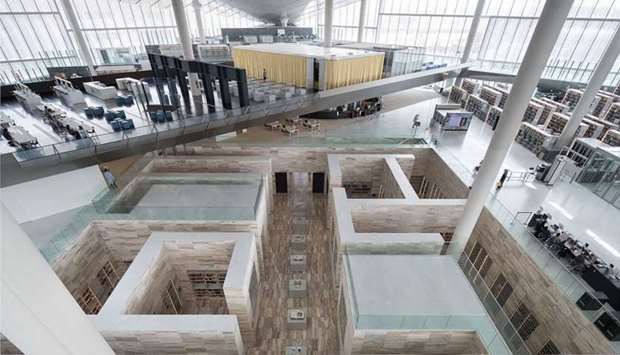Qatar National Library (QNL), in collaboration with the Centre for Manuscript Studies at Fatih Sultan Mehmed Waqf University in Istanbul, Turkey, hosted a lecture, “Manuscript Studies: Disciplines and Approaches,” on February 27. The event was part of a series of lectures on manuscript studies that features renowned international experts in Islamic codicology and related fields.
Idham Hanash, professor of Manuscripts and Islamic Arts and director, Encyclopedia of the Arabic Manuscripts at the House of Manuscripts in Istanbul, delivered the lecture, which discussed the methods for studying manuscripts and their cognitive trends, as well as manuscript science. The lecture was inaugurated by HE the Minister of State and QNL president Dr Hamad bin Abdulaziz al-Kawari, and Mohammed Fatih Kaya, lecturer at Fatih Sultan Mehmed Waqf University.
Dr al-Kawari, said: “The world still looks with a keen eye at Arab and Islamic heritage through the manuscripts of scientific and scholarly works, which are undisputedly the most important intellectual achievement of Arab-Islamic civilisation. The protection of Arab and Islamic manuscripts reflects a key part of our responsibility to contribute to the preservation of these important heritage items.”
Fatih Sultan Mehmed Waqf University’s participation with QNL in the lecture is part of a wide range of cooperation with Turkish cultural institutions. QNL signed a strategic Memorandum of Cooperation with the Nation’s Library (NsL) of Turkey to expand knowledge in the fields of education, science and culture, and promote the development of librarianship. In addition, the NsL also donated 400 books by popular Turkish authors to QNL, covering topics such as politics, public affairs, research and cuisine.
The next monthly manuscript studies lecture series entitled, “Types of Authorship and its Relations in Arab Heritage," will be held on March 13 and delivered by Kamal Arafat Nabhan, professor of Information Science. Prof Nabhan authored the book, The Genius of Arabic Authorship: Text Relations and Scientific Communication, which has won international awards and is taught as part of academic courses in several Arab universities for postgraduate studies.
Idham Hanash, professor of Manuscripts and Islamic Arts and director, Encyclopedia of the Arabic Manuscripts at the House of Manuscripts in Istanbul, delivered the lecture, which discussed the methods for studying manuscripts and their cognitive trends, as well as manuscript science. The lecture was inaugurated by HE the Minister of State and QNL president Dr Hamad bin Abdulaziz al-Kawari, and Mohammed Fatih Kaya, lecturer at Fatih Sultan Mehmed Waqf University.
Dr al-Kawari, said: “The world still looks with a keen eye at Arab and Islamic heritage through the manuscripts of scientific and scholarly works, which are undisputedly the most important intellectual achievement of Arab-Islamic civilisation. The protection of Arab and Islamic manuscripts reflects a key part of our responsibility to contribute to the preservation of these important heritage items.”
Fatih Sultan Mehmed Waqf University’s participation with QNL in the lecture is part of a wide range of cooperation with Turkish cultural institutions. QNL signed a strategic Memorandum of Cooperation with the Nation’s Library (NsL) of Turkey to expand knowledge in the fields of education, science and culture, and promote the development of librarianship. In addition, the NsL also donated 400 books by popular Turkish authors to QNL, covering topics such as politics, public affairs, research and cuisine.
The next monthly manuscript studies lecture series entitled, “Types of Authorship and its Relations in Arab Heritage," will be held on March 13 and delivered by Kamal Arafat Nabhan, professor of Information Science. Prof Nabhan authored the book, The Genius of Arabic Authorship: Text Relations and Scientific Communication, which has won international awards and is taught as part of academic courses in several Arab universities for postgraduate studies.

